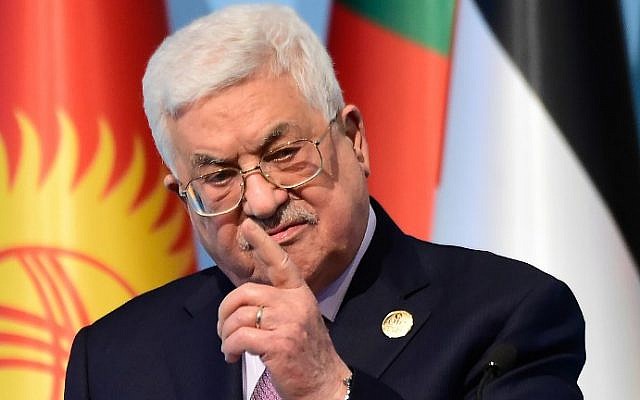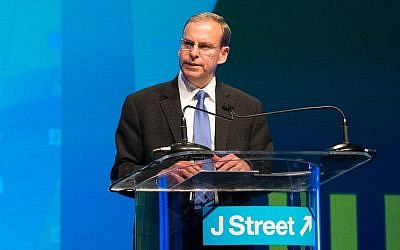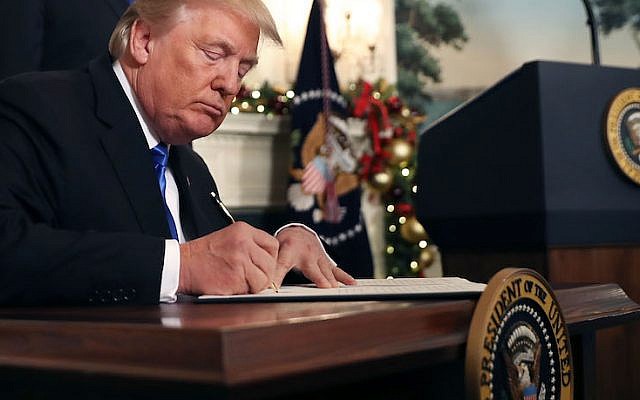Dovish Israel lobbying group calls remarks by Palestinian leader at Istanbul summit ‘divisive and inflammatory,’ says PA still needs Washington to help broker peace

WASHINGTON — In a rare reproach, the liberal Mideast policy group J Street rapped Palestinian Authority President Mahmoud Abbas on Thursday for his speech at the Organization of Islamic Cooperation (OIC), which it characterized as “divisive and inflammatory.”
The language mirrored a similar criticism from more hawkish Israel lobbying group AIPAC, which said the Palestinian leader had “set back the cause of peace” with his remarks.
Following US President Donald Trump’s controversial decision last week to formally recognize Jerusalem as Israel’s capital — while setting in motion plans to move the US embassy there from Tel Aviv — Abbas on Wednesday urged the international community to roll back its recognition of Israel and said the Palestinians would no longer work with the US and threatened the Palestinians might no longer be bound by commitments agreed to in earlier peace talks.
He also refused to recognize any historical Jewish connection to Jerusalem.
“We will tell the Israelis that we are no longer committed to any agreement from Oslo until today,” Abbas threatened. He declared that the PA intended to return to the United Nations to circumvent negotiations and gain full membership.
“If there is no Palestinian state along the June 1967 borders with Jerusalem as its capital, there will not be peace in the region, in the territories or in the world,” he said. “They must choose.”
While recognizing the Palestinian leader’s frustration with the Trump administration, J Street said it “rejected” his rhetoric and stated that the Palestinian national movement still needed the United States to advance its agenda.
“The US can and must play a vital and productive role in facilitating negotiations toward a comprehensive two-state solution,” the statement said. “The harmful actions of President Trump can be overturned by future administrations and leaders who understand the value of serious diplomacy and the urgent necessity of resolving this conflict.”
The progressive organization has generally been an ally of Abbas and has been critical of Israeli actions — especially settlement expansion — which it says are a key factor in the persistence of the Israeli-Palestinian conflict.
J Street’s comments closely followed other criticism from other Jewish groups, representing a rare point of accord with the American Israel Public Affairs Committee and other more conservative organizations.
AIPAC said Abbas’s speech set a “dangerous new course” which would “set back the cause of peace.”

“Rather than threatening Israel and America, Abbas should end extreme statements and condemn incitement to violence. Israel is ready for direct talks; the Palestinians should join it at the table,” the powerful pro-Israel lobby said in a statement.
In a statement earlier Thursday, Conference of Presidents of Major American Jewish Organizations chairman Stephen M. Greenberg and CEO Malcolm Hoenlein said Abbas’s speech was “as rejection of peace with Israel.”
“President Abbas has consistently openly promoted the denial of any Jewish connection to Jerusalem to his own people, in the UN and its agencies and bodies, and in international legal fora,” the statement said. “His threat to go to the United Nations to undo the US measure – which it cannot do – and to gain recognition of the State of Palestine is the death knell for negotiations. His speech today at the OIC summit in Istanbul is also the latest attack on foundational beliefs of the Jewish faith and historical truth.”
Abbas remarks also drew rebuke from Israeli leader Benjamin Netanyahu and the White House, which insisted it was still committed to brokering a peace accord.
“This rhetoric, which has prevented peace for years, is not surprising as we anticipated reactions like this,” an unnamed senior administration official told The Times of Israel on Wednesday. “We will remain hard at work putting together our plan, which will benefit the Israeli and Palestinian peoples.”

Netanyahu responded to Abbas by saying the Palestinians should “face the reality” that Jerusalem is the capital of Israel.
In an address last week from the White House, Trump insisted that after repeated failures to achieve peace, a new approach was long overdue, describing his decision to recognize Jerusalem as the seat of Israel’s government as merely based on reality.
The move was hailed by Netanyahu and by leaders across much of the Israeli political spectrum. Trump stressed that he was not specifying the boundaries of Israeli sovereignty in the city, and called for no change in the status quo at the city’s holy sites.
As reported by The Times of Israel
